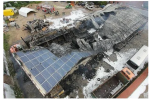David S
Junior Member
- Joined
- Dec 11, 2018
- Professional Status
- Certified Residential Appraiser
- State
- California
Like any other appraisal assignment, we can use three approaches to value it: 1. Sales comps, pull the nearby similar houses sold price to see what's the difference between with and without solar panels to extract solar value; 2. Cost approach, ask the invoice from the owner to get cost new, then apply deprecation to get the solar value; 3. Income approach, figure out how much utility bill saving, then use cash flow method to get solar value. So far I use cost approach most times. The reasons are: 1. I can get solar panel invoice from the owner or city hall. Pretty much it is a factual data and reliable. 2. Most solar system are still fairly new, probably in less 5 years here? So the depreciated value is pretty reliable too. Normally I use shorter depreciation schedule, like 10 year deprecation, although it should work around 15~20 years. So far client / lender no question yet. The final value range here is about $10K ~$20K depends on how many panels / larger or smaller and how old the panel is.I have a house Im planning to sell and I installed 16.8KW of solar on the house. Its bought and paid for which is a bit rare for panels now a days... My question is (preferable relatable to the Michigan market if its not universal) how do you value a paid for system? I have seen quotes online for 5-6k per KW of installed system in regards to home value, but is that the case (this is normally from solar friendly sites)? Is there some other metric that is used or standard to add that value when a comp doesnt exist?
The house is 100% electric and had a NET $0/m bill including charging a standard EV so there is definitely value there, but Im not sure how much or the logic behind it.
For lease solar panel, the value is ZERO.




